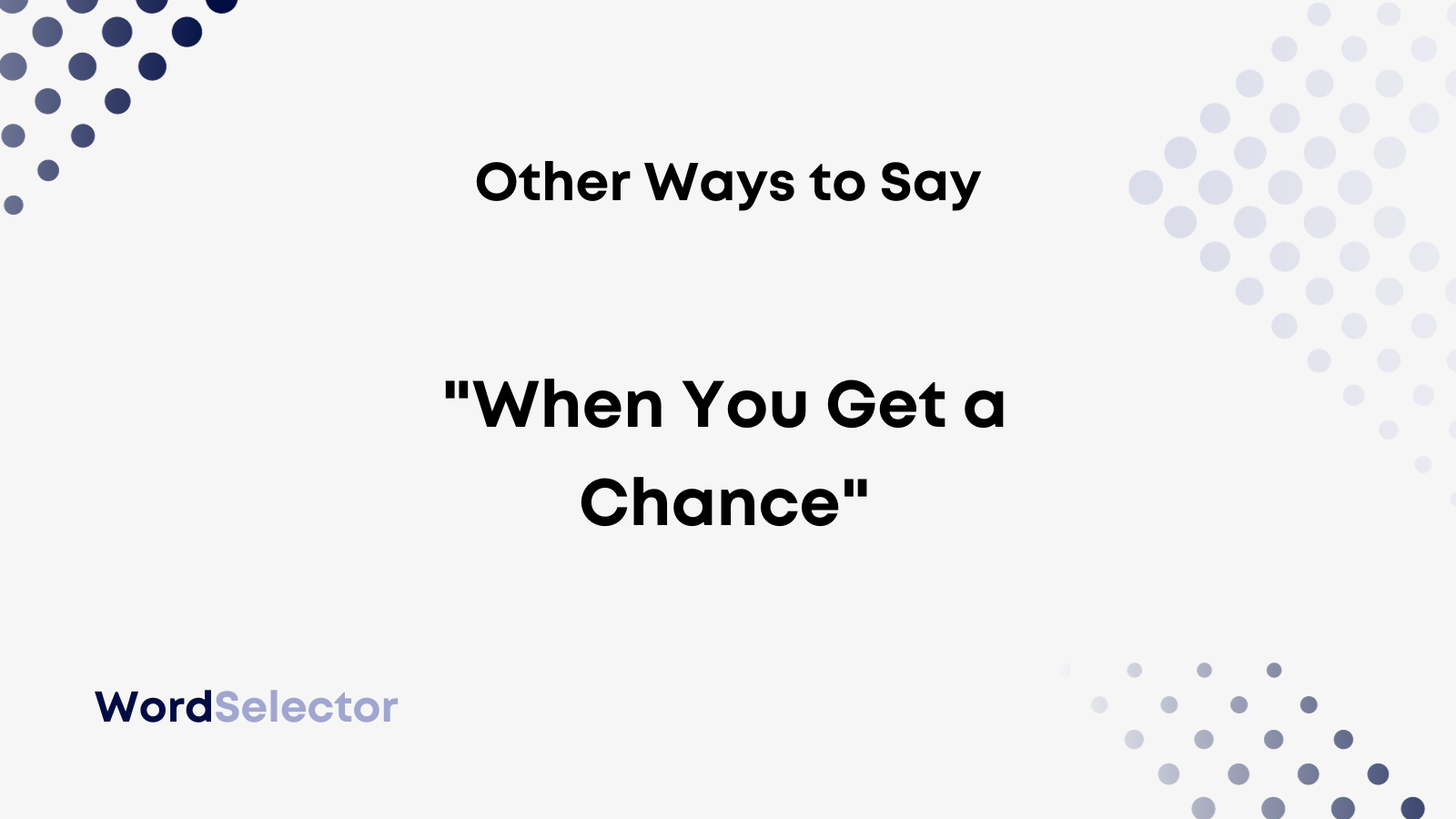Are you trying to ask someone to do something for you, but you don’t want to rush them?
Perhaps you’d like to use “when you get a chance,” but you’re a little worried it’s too pushy or unprofessional.
Well, you’re in the right place.
This article will explain how to say “when you get a chance” in an email to keep things sincere.
Other Ways to Say “When You Get a Chance”
- At your earliest convenience
- In your own time
- When it’s convenient for you
- When you have a moment
- If you find the time
- When the opportunity arises
- When you’re free
- Whenever you’re ready
- When it suits you
- If you can spare a moment
- When you’re not too busy
- At a time that works for you
KEY TAKEAWAYS
- “When you get a chance” is polite and formal, and it shows you respect someone’s busy schedule.
- “At your earliest convenience” is a great professional phrase to include in your writing.
- Try using “in your own time” to sound a bit more genuine and informal when you need to.
Keep reading to learn how to say “when you get a chance” professionally and informally. We’ve touched on the best two phrases to help you explore your options.
Also, you can read the last section to learn whether it’s correct to write “when you get a chance.” Then, you’ll know whether you can include it in your emails.
At Your Earliest Convenience (Formal)
You can use “at your earliest convenience” as a formal way to say “when you get a chance.”
This phrase is professional and respectful above all else. It shows that you value and respect someone’s busy schedule.
You can use it when emailing your boss. After all, it’ll let them know that you understand how busy they are.
Once they’ve stopped being busy, you’d like them to fulfill something for you. Until then, you’re happy waiting to hear back from them.
Feel free to review this email sample if you still need help with it:
Dear Mr. Murphy,
Could you please give me a call at your earliest convenience?
I have some things I’d like to discuss with you.
Best wishes,
Joe Bradley
In Your Own Time (Informal)
Feel free to use “in your own time” as another way to say “when you get a chance.”
This one is more friendly and conversational. It works really well when writing to a coworker and asking them to help you with something.
You might also want them to get back to you when they can. So, this is a great way to show that you still respect a colleague’s schedule and you don’t mind waiting for them to be free.
Also, here’s a great email sample to help you with it:
Hi Tony,
Could you get back to me in your own time?
I’m intrigued to hear your thoughts on this situation.
Thank you so much,
Ben Dickens
Feel free to check out this message sample if you still need help using it informally:
In your own time, I’d appreciate it if you could go through this with me. I trust your judgment more than my own.
Is It Correct to Say “When You Get a Chance”?
It is correct to say “when you get a chance.” It’s polite and formal, and it generally shows that you’re happy to wait for someone to do something for you when possible.
Generally, this is a way to respect someone’s busy schedule. We recommend it when emailing someone you respect or care about, as it shows that you don’t want to pressure them.
Check out this email sample if you still need help understanding how it works:
Dear Mr. Smith,
Please review the work I’ve sent you when you get a chance.
I’d be interested in hearing your thoughts about it.
Best regards,
Danny Trilby
Also, you can mix things up by including the following variation in your writing:
- When you have the chance.
It means the same thing, but “have” can switch in for “got” to keep your writing more personal.
Sometimes, you might need a comma when using the phrase. However, this only applies when using the phrase as an introductory clause.
For instance, you should use a comma here:
- When you get a chance, could you please call me?
However, you shouldn’t use a comma when it works as a secondary phrase.
You can refer to these examples to learn how to use “when you get a chance” in a sentence:
- Call me when you get a chance.
- Give me a call when you get a chance.
- Please let me know when you get a chance.
Finally, don’t forget to bookmark this page to remind you of what to say instead of “when you get a chance.” That way, you can always have these alternatives ready to help you when needed.

